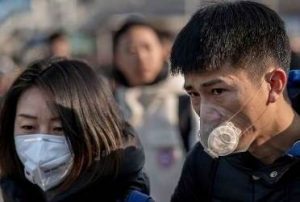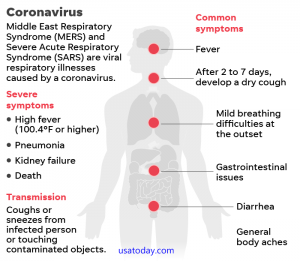nCa Report
The Wuhan virus has infected hundreds of people in China and some cases have been identified in other countries including Thailand, Japan, South Korea, Taiwan, and the USA.
The WHO experts are evaluating the risks.
However, there is no need for panic in Central Asia. Some standard precautions, similar to the ones taken during the outbreak of previous such viruses, should adequately contain the risk.
* * *
The Wuhan Virus is known by various names including Novel coronavirus (2019-nCoV), Wuhan Flu, Wuhan Pneumonia, etc.
It is a new strain from the coronavirus group, first identified in its outbreak (so far, the only outbreak) in the seafood and animal wholesale market in the Wuhan city of China.
* * *
Here are some guidelines provided by the WHO:
What is a coronavirus?
Coronaviruses are a large family of viruses that are known to cause illness ranging from the common cold to more severe diseases such as Middle East Respiratory Syndrome (MERS) and Severe Acute Respiratory Syndrome (SARS)
What is a novel coronavirus?
A novel coronavirus (CoV) is a new strain of coronavirus that has not been previously identified in humans.
Can humans become infected with a novel coronavirus of animal source?
Detailed investigations found that SARS-CoV was transmitted from civet cats to humans in China in 2002 and MERS-CoV from dromedary camels to humans in Saudi Arabia in 2012. Several known coronaviruses are circulating in animals that have not yet infected humans. As surveillance improves around the world, more coronaviruses are likely to be identified.
What are the symptoms of someone infected with a coronavirus?
It depends on the virus, but common signs include respiratory symptoms, fever, cough, shortness of breath, and breathing difficulties. In more severe cases, infection can cause pneumonia, severe acute respiratory syndrome, kidney failure and even death.
Can coronaviruses be transmitted from person to person?
Yes, some coronaviruses can be transmitted from person to person, usually after close contact with an infected patient, for example, in a household, workplace, or health care centre.
Is there a vaccine for a novel coronavirus?
When a disease is new, there is no vaccine until one is developed. It can take a number of years for a new vaccine to be developed.
Is there a treatment for a novel coronavirus?
There is no specific treatment for disease caused by a novel coronavirus. However, many of the symptoms can be treated and therefore treatment is based on the patient’s clinical condition. Moreover, supportive care for infected persons can be highly effective.
What can I do to protect myself?
Standard recommendations to reduce exposure to and transmission of a range of illnesses include maintaining basic hand and respiratory hygiene, and safe food practices and avoiding close contact, when possible, with anyone showing symptoms of respiratory illness such as coughing and sneezing.
Are health workers at risk from a novel coronavirus?
Yes, they can be, as health care workers come into contact with patients more often than the general public. WHO recommends that health care workers consistently apply appropriate infection prevention and control measures.
What are WHO recommendations for countries?
WHO encourages all countries to enhance their surveillance for severe acute respiratory infections (SARI), to carefully review any unusual patterns of SARI or pneumonia cases and to notify WHO of any suspected or confirmed case of infection with novel coronavirus.
Countries are encouraged to continue strengthening their preparedness for health emergencies in line with the International Health Regulations (2005).
* * *
Common and severe symptoms of coronavirus infection
* * *
At personal level, everyone should generally avoid being in a crowd for long periods, especially when there is the risk of catching cold.
Wash hands with soap, scrubbing for at least 20 seconds. Every time you return home, wash hands. Regardless of any threat of virus, the children should be taught that the first thing after returning home should be to wash the hands and face.
If the common symptoms appear, remain as isolated as possible from the other family members, keep your personal crockery separate from other family members, and wash it immediately after use.
In case of common symptoms of cold, take rest, and consume plenty of liquids.
Dress appropriately. This applies to everyone but especially to the vulnerable groups such as children, the elderly, and the people with lowered immunity for whatever reason.
Take care of your throat. The throat is the main line of defence against such viruses. Gargle daily with light antiseptics.
At government level, the infrared sensors should be installed at airports, border crossing points, and other areas where people from different countries and areas mix. These sensors are available in every country of Central Asia when they were purchased during the previous threats of SARS and MERS.
Be cautious but don’t panic. This virus will hopefully abate within the next few weeks. The government of China has quarantined Wuhan and the rail and air service from Wuhan to other parts of China or the world has been suspended. /// nCa, 23 January 2020

